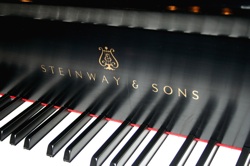Carlo Lombardi
Carlo Lombardi, once a child musical prodigy of the piano who gave his first concert in New York at the age of ten, is today a great and original world-class pianist of elemental force and power and of colossal pianistic achievements in terms of artistic depth and breadth. Within the Grand Manner of Carlo Lombardi’s stunning, magnificent, hypnotic and stupendous virtuosity together with his brilliant and gargantuan mastery of an enormous pianistic repertoire which includes the entire eighteenth and nineteenth century standard literature for the solo pianoforte, Carlo Lombardi both spectacularly and uniquely carries into the Twenty First Century the nineteenth-century musical traditions and pianistic styles and techniques of Franz Liszt and Anton Rubinstein as these became integrated and embodied, at the turn of the Twentieth Century during the “Golden Age of Pianism,” within the diverse pianistic styles and techniques of Ferruccio Busoni, Ignace Paderewski, Moritz Rosenthal, and Leopold Godowsky—each of whose pupils, respectively: Paolo Denza, Harold Bauer, Robert Goldsand, and Clarence Adler were Carlo Lombardi’s teachers during his early training as a pianist.
Recipient throughout his performing career of the highest praise as a solo pianist, Carlo Lombardi’s playing has been likened to “an elemental force of nature.” There is ”a mesmerizing sense of inevitability in a Carlo Lombardi performance which captures, engulfs, and overwhelmingly sweeps one downstream as would a mighty river—initially within its gentle, subtle, coaxing currents; then, within its broad, surging flow; and finally,-----within its wildly raging torrents as these rush headlong and disperse into a boundless ocean.” Carlo Lombardi has been praised by music critics in Europe as “a great, original pianist” who plays “in the Grand Manner” of the late Nineteenth Century Golden Age of Pianism. His “hypnotic, stupendously impelling virtuosity” and his “colossal, magnificent piano technique” have been internationally recognized in New York and Rome ever since the season of his mature pianistic debuts during his early twenties. Also lauded and praised in the Americas and Europe have been his “spectacular pianistic re-creations”; his “stunning, uniquely penetrating interpretations”; his “unmatched lyrical and declamatory sense of musical rhetoric”; his “brilliant and gargantuan mastery of the piano and its entire repertoire”; his “incomparably expressive and beautiful tone quality at all dynamic levels”; and, “the pristine, never-failing absolute poise of his textural transparency, his rhythmic articulation, and his clarity of detail.”
Compelled at age thirty-nine to temporarily terminate an early, very successful fifteen-year adult concert career because of personal tragedy and very unusual circumstances, Carlo Lombardi nevertheless, during this hiatus, assiduously continued to develop his pianistic art by completing his study and monumental pianistic mastery of the entire classical and romantic solo piano literature of the eighteenth, nineteenth, and early twentieth centuries. At the same time, he also earned the Ph.D. degree at New York University with a dissertation on 18th Century Classic keyboard music which was subsequently published as a book by the Dowling College Press.
Each of the almost 550 individual works, large and small, which comprise the contents of the 48 Volumes of the “Piano Omnibus Collection”, the 36 CD’s of the “Piano Masterworks Series”, and the single “Famous Piano Classics” CD were recorded by Carlo Lombardi during the early years of the first decade of the Twenty First Century. The works that Carlo Lombardi personally selected to be included in these three recorded publications were specifically designed to comprehensively exhibit the scope and depth of the classical and romantic literature and repertoire for the solo piano and, at the same time, also be inclusive of the most representative and characteristic compositions composed for the solo piano during the eighteenth, nineteenth, and early twentieth centuries.
These recordings extend and continue into the Twenty First Century pianistic traditions which had been established in the past by such landmark events, to mention a few, as the nineteenth-century and early twentieth-century historical piano recitals of Anton Rubinstein, Moritz Rosenthal, and the all-Liszt programmes of Ferruccio Busoni.
